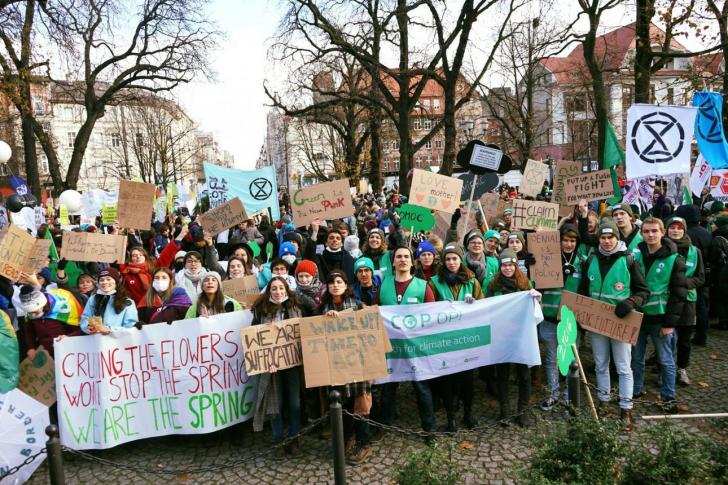GYG Delegate Eva Pfannerstill reports on COP24: My ten personal key takeaways from COP24.
While COP24, the UN Climate Change Conference in Katowice (Poland), is in its final overtime negotiating hours, I am trying to compile what I am taking away from having been part of it.
- The detachment of the negotiations from the urgency to act on the climate crisis out there in the real world often feels absurd.
- Multilateralism is complicated: The UN consensus principle can be extremely frustrating because one country fundamentally opposing everything can stop any progress. And multilateralism is slow. The importance lies in seemingly small details of the language, negotiations on one word or sentence can go on for days and more. But at least, in these times, with multilateralism in crisis, it gave me hope to see multilateralism at work.
- Most parties, such as the EU, see the main goal of the conference as reaching an agreement on any rulebook at all – the content and how much that really meets the need to reduce emissions drastically and to help vulnerable countries to adapt, seems to be less important in the end…
- Scientific input has an impact: After the IPCC special report on 1.5 degrees warming, most states generally now seem to recognize 1.5 degrees warming as a goal instead of 2 degrees. And most of the delegations, except the US and Saudi-Arabia, were standing up for “welcoming” the IPCC report in the conclusions document of the conference.
- Human rights have been deleted from the Paris Rulebook text. Not just the NGOs present at COP, but as well many nations were unhappy about this. But finalising the document at all was more important to them than to really try getting them back in. On the plus side, the so-called “Indigenous Platform” on the rights of Indigenous communities was adopted.
- Loss and damage is – of course – not viewed as a priority by the “developed countries”. (Loss and damage is the mechanism where those countries that are due to their past industrialisation mainly responsible for climate change support the vulnerable and usually poorer nations in adapting to climate change and repairing the damage done by climate change.) The industrialised nations probably want to avoid any possibility of states hit by climate change to go to court against them. In the draft final text, this topic has been relegated to a mere footnote, a fact that is very much contested by the developing countries.
- Any negotiations concerning emissions from aviation and maritime transport were postponed. This is concerning, because fast action is needed against the rising emissions from these sectors. They are not regulated in the Paris Agreement or Rulebook so far, because they do not fall under any national emission budget. The current self-set goals of the IMO (International Marine Organization) and especially of the ICAO (International Civil Aviation Organization) are a laugh. (If you want to read more on the plans of ICAO for “environmentally responsible aviation”, see here)
- The Polish government really loves coal. The Polish President, Andrzej Duda, even spoke of “clean coal” in his opening speech of the conference. Believe it or not: Several fossil fuel companies were official sponsors of the COP!
- Sadly, there has been no compulsory outcome of the talks on increasing ambition in emission reductions. This way, we are on track not to 1.5 °C warming, not even to 2 °C warming, but to 3 °C and maybe more. And the window of time to act is closing fast (some say, in the next 12 years).
- People power: It was highly motivating to meet the international climate movement at COP. Because, as even a negotiator said, without pressure from civil society nothing will ever move forward. Feeling the strength of the movement with so many young climate activists, seeing the engagement, the ability to organize, and the creativity, was inspiring. Youth, feminists, indigenous people, environmentalists, and many other groups protested together in a large demonstration in the center of Katowice. “We are unstoppable – another world is possible!”


